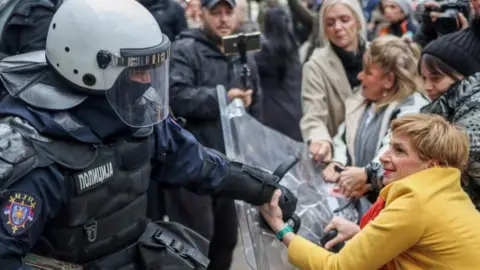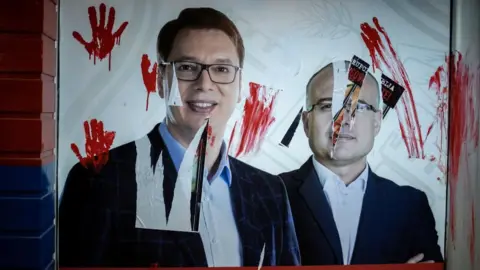After three weeks of protests demanding justice following the deadly collapse of part of the railway station in Serbia’s second city, arrests have begun.
Prosecutors ordered the questioning of 11 people in connection with the disaster at the recently-renovated facility in Novi Sad.
15 people died after a concrete and glass canopy fell on them at the start of the month.
Novi Sad has been in a decidedly angry state of mourning ever since.
More than 20,000 people took to its streets and squares during one demonstration – the biggest protest seen in the city for decades.
Participants have been using the slogan “corruption kills”.
They claim the opaque procurement procedures the government has used for infrastructure projects have enriched a few favoured contractors while putting public safety at risk.
 Reuters
ReutersSerbia’s former construction minister was among those arrested.
Goran Vesic resigned in the days following the collapse of the canopy at the recently renovated station. But he denied any culpability.
“I cannot accept guilt for the deaths,” he said as he announced he was standing down, “because I, and the people who work with me, have not an ounce of responsibility for the tragedy that occurred”.
It seems prosecutors may be taking a different view. They say they are investigating “criminal acts against public safety”.
Vesic, however, has been keen to portray himself as a co-operative witness, rather a suspected perpetrator.
“I voluntarily responded to the call of police officers with whom I came to Novi Sad and made myself available to the investigative authorities,” he posted on social media.
The arrests follow a televised address on Tuesday in which Serbia’s president, Aleksandar Vucic, warned of consequences for those who were responsible for the disaster.
“15 people did not die because of their own fault, but because someone didn’t do their job properly,” he said.
The problem for President Vucic is that he has made himself very closely associated with Novi Sad railway station. It is a key stop on the government’s flagship infrastructure project – the high-speed line from Belgrade to Budapest.
Vucic inaugurated the station in 2022, alongside Hungary’s prime minister, Viktor Orban.
“This is our way to modern Europe – our way to a better, progressive Serbia,” he told the BBC at the time.
 Reuters
ReutersReconstruction continued at the station even after the inauguration – and this summer there was another opening ceremony.
There was heavy symbolism surrounding this month’s station disaster as well as a high cost in human lives.
Serbia’s opposition parties have been quick to attack President Vucic and his Progressive Party government, arguing that nepotism and a culture of impunity are behind the canopy collapse.
“The slogan of the people is that we are all below this canopy that’s called Serbia – it can collapse wherever you are,” says Biljana Djordjevic, co-leader of the Green-Left Front.
“The Progressive Party base their power on the claim that they are building the country – and that this increases living standards. If now people feel unsafe about this, then their policy is seen as invalid.”
The protesters are unlikely to be satisfied by today’s arrests.
They have consistently demanded the resignations of Prime Minister Milos Vucevic – a former mayor of Novi Sad – and the current office-holder, Milan Djuric.
If the judicial process can find quick and credible answers, that may calm the crowds.
Otherwise, President Vucic and the government may be in for a bumpy ride.
